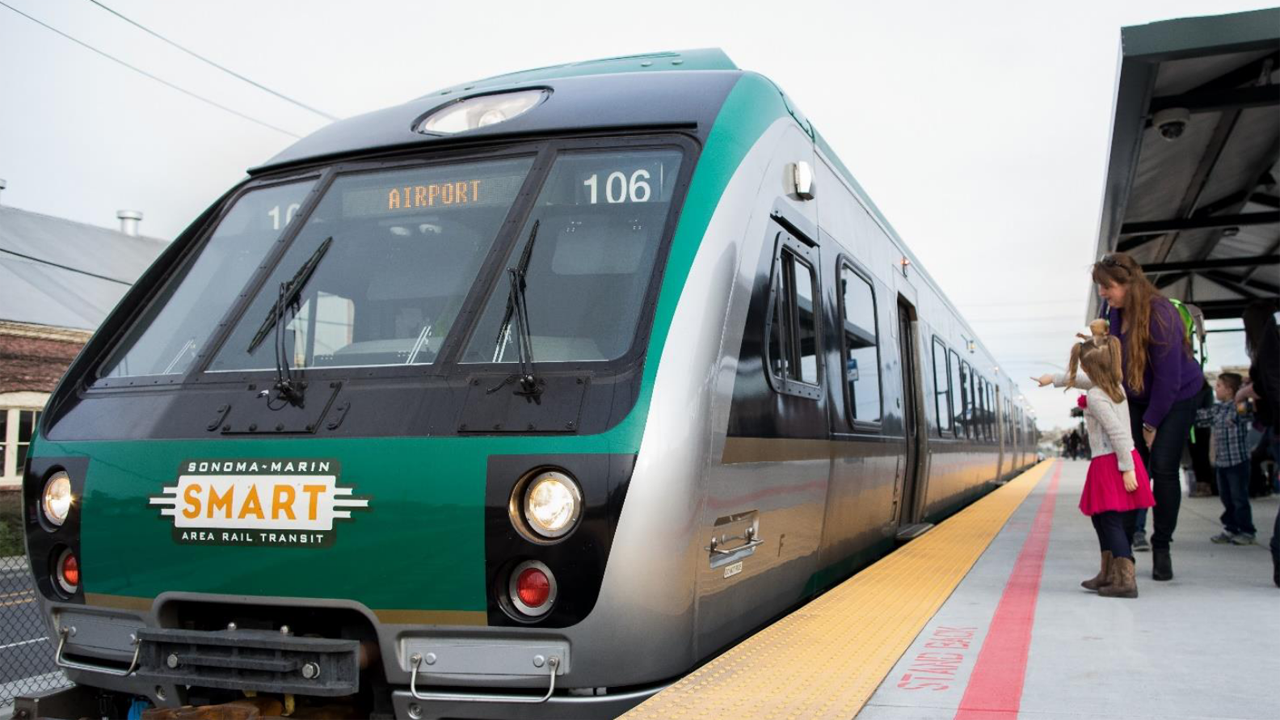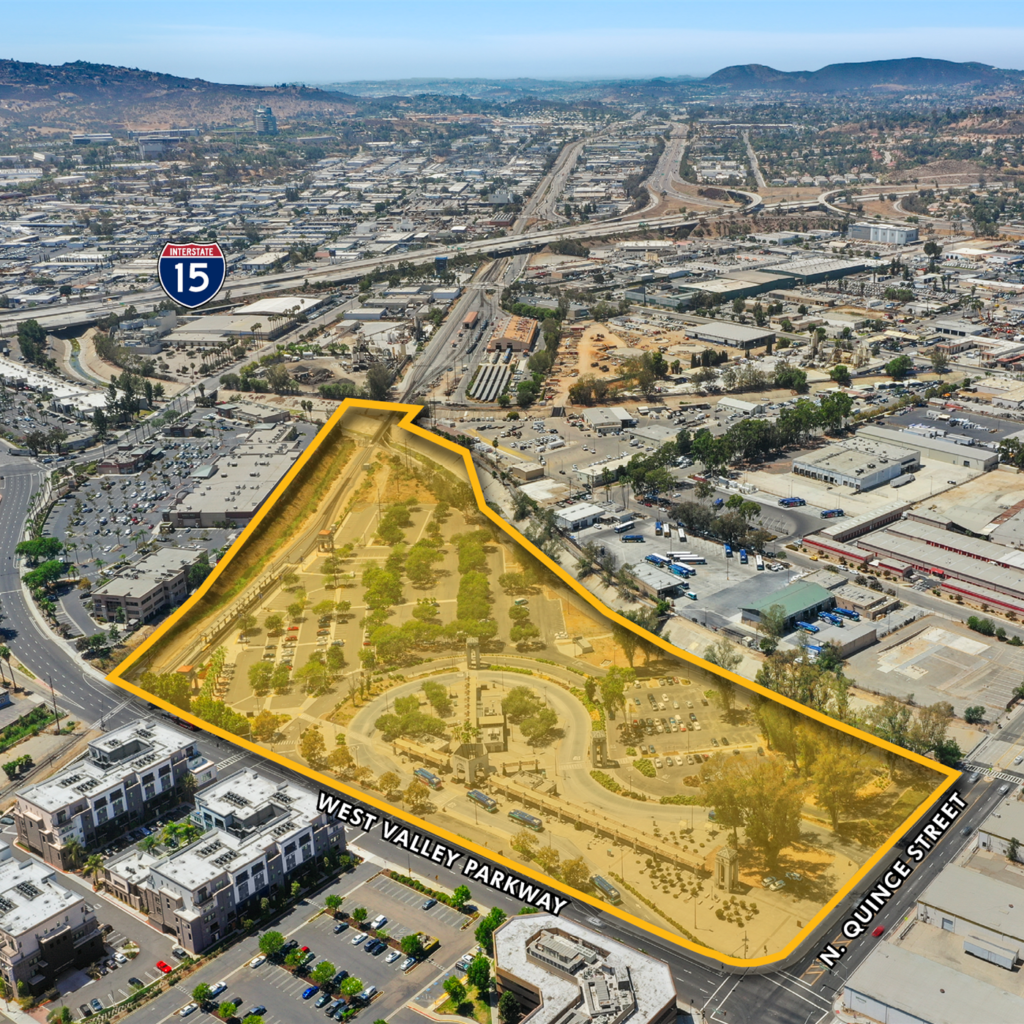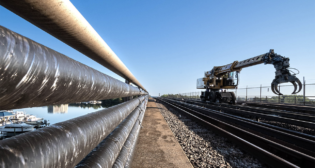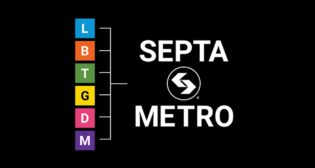
Transit Briefs: SMART, NCTD, CTDOT
Written by Carolina Worrell, Senior Editor
Sonoma-Marin Area Rail Transit (SMART) awards a $32.5 million contract for a second Petaluma train station. Also, North County Transit District (NCTD) authorizes an exclusive negotiating agreement for the Escondido Transit-Oriented Development (TOD) project; and the Connecticut Department of Transportation (CTDOT) finalizes Service and Fare Equity (SAFE) analysis.
SMART
The SMART Board of Directors on Oct. 18 voted unanimously to authorize the general manager to execute a $32.5 million contract with Stacy and Witbeck Inc. and Ghilotti Bros Inc. to construct a long-planned second train station in Petaluma, Calif., according to a Marin Independent Journal report.
According to the report, “SMART first envisioned a second Petaluma station nearly two decades ago as part of its plan for a 70-mile rail corridor connecting Larkspur to Cloverdale. The new station, which will be at Corona Road and McDowell Boulevard, is about three miles northwest of the downtown station.”
Crews, the Marin Independent Journal reports, are expected to begin prepping for construction next month, and a groundbreaking ceremony is planned at the site at noon Nov. 9. The project is slated for completion in late 2024, according to SMART spokesperson Julia Gonzalez.
According to the Marin Independent Journal report, in addition to the station platform, the project will include reconstruction of the McDowell Boulevard crossing and two path segments equaling about 5.6 miles along the rail line.
One 2.7-mile path segment will link South Point Boulevard in Petaluma to Main Street in Penngrove. The project will include a 120-foot pedestrian bridge, four road crossings with signals and direct connection to the new station, according to the report.
According to the report, the second path will be 2.9 miles from Golf Course Drive in Rohnert Park to Bellevue Avenue in Santa Rosa. The project will include a 110-foot pedestrian bridge and four road crossings with signals. The addition will create a “nearly continuous” path from Sonoma Mountain Village to the Guerneville Road train station.
“To award the contract, the board first had to approve a budget adjustment to make up for a $7.6 million funding shortfall,” according to the report. “The agency had initially allocated about $26.7 million for the project. However, based on the contractors’ joint bid of $31.7 million, the total cost of the project is estimated to be around $37.8 million.”
SMART CFO Heather McKillop said the project is “set to receive $3.2 million grant from the Affordable Housing and Sustainable Communities fund. The agency also has $295,690 in Measure M funds remaining from project design costs,” according to the Marin Independent Journal report.
McKillop said the agency “could draw $6.5 million in Measure Q funds—which was earmarked for path project from Guerneville Road to Airport Boulevard in Santa Rosa—to push the Petaluma station project forward,” according to the report.
“The agency will then look for grants to backfill the shortfall for that Santa Rosa path project,” McKillop said.
The project also includes a new crosswalk across McDowell Boulevard that will link to the new path at the station. “Because Petaluma recently repaved McDowell Boulevard, the city and SMART have agreed to defer a portion of the paving to incorporate it into the station’s construction contract,” according to the Marin Independent Journal report.
SMART approved a contract on Oct. 18 stipulating that Petaluma would pay for the $806,102 of paving work. This amount, the Marin Independent Journal reports, is not reflected in the project total estimates.
Separately, the Danco Group in Arcata is pursuing plans to build 131 affordable dwellings next to the Corona Road station and offered to sell SMART a one-acre parcel to use for station parking, according to the report.
The project, the Marin Independent Journal reports, will feature seven apartment buildings on 5.29 acres and include 33 supportive housing apartments. Last month, the project received a $30.2 million infusion of funding from the state.
SMART engineer Bill Gamlen said, “plans are still shaping up for the parking lot,” which will provide more than 100 stalls. The lot will also feature 12 bicycle parking spaces, 12 bicycle lockers, six electric vehicle charging stations and hookups for solar infrastructure, according to the report.
NCTD
The NCTD Board of Directors on Oct. 19 voted in favor of entering in an Exclusive Negotiation Agreement (ENA) with Toll Brothers Apartment Living and Waterford Property Company, a general partnership, for the redevelopment of the Escondido Transit Center.
The Board action, according to NCTD, “is the first step toward transforming the existing transit center in a vibrant community gathering space where residents and visitors can live, work, play and ride.”
“Redeveloping the Escondido Transit Center will improve the rider experience, bring new amenities, and generate transit ridership by activating the site and connecting it to needed housing and retail space,” said NCTD Chief Development Officer Tracey Foster. “We are confident that Toll Brothers and Waterford have the requisite experience and knowledge of the Escondido community to make the project successful.”

A Request for Proposals (RFP) was advertised from October 2022 through May 2023 to solicit for a mixed-use development project at NCTD’s Escondido Transit Center. Redevelopment of the site, NCTD says, “will maximize underutilized land around the existing center and create an engaging mobility hub that will increase ridership and regional connectivity, enhance the overall transit experience and support sustainability goals.”
The criteria in the RFP emphasized transit prioritization and transit amenities. The Board authorized an exclusive negotiating agreement with Toll Brothers and Waterford on the 12.69-acre Escondido Transit Center site. Entering the ENA, NCTD says, will allow all parties to work through the next steps in the planning process, including project design and engaging with the community on project features. Toll Brothers and Waterford are required to work within the City of Escondido’s entitlement process.
“Toll Brothers is excited to be a part of the process of reimagining and revitalizing the Escondido Transit Center,” said Michael McCann, Regional Director of Toll Brothers Apartment Living. “We look forward to continuing our collaboration with the North County Transit District and to working closely with residents, city leaders, and the team at Waterford Property Company on this important redevelopment opportunity.”
“The Escondido Transit Center is an opportunity to be a catalyst project for Downtown Escondido—a community we’re especially proud to be part of,” added Sean Rawson, Waterford Property Company Co-Founder. “This collaborative effort with NCTD, the city of Escondido and Toll Brothers is sure to result in a project that achieves NCTD goals, creates market rate and affordable housing and provides public gathering spaces and placemaking elements that reinforce Escondido as a great place to live, work, and visit.”
According to NCTD, benefits of the redevelopment project include “generation of revenue through a long-term ground lease, increased transit ridership, creation of jobs, development of onsite housing with a range of affordability levels, and a reduction of automobile reliance.” NCTD says it envisions that the redeveloped transit center will serve as a mobility hub that connects to existing trails and multi-modal access points and extends the historic downtown Escondido area. In addition to supporting NCTD’s long-term goals, the project, the agency says, will “also help fuel economic growth, support local and state climate change and air quality goals, and advance [the] region’s transit connectivity.”
“NCTD’s redevelopment plans address the region’s growing need to promote the use of a sustainable, efficient, and accessible transportation network while providing a sense of a thriving community at this transit center for decades to come,” stated Foster.
Escondido Transit Center is one of 11 sites being advanced for redevelopment by NCTD, all of which are in various stages of redevelopment. The other projects include Carlsbad Village and Poinsettia Stations, Oceanside Transit Center, and seven SPRINTER Station locations.
CTDOT
CTDOT on Oct. 20 announced the finalization of the most recent SAFE Analysis, which included proposed rail and bus service changes, rail fare increases, and an evaluation of the reintroduction of bus fares.
CTDOT accepted comments regarding the proposed changes via email, mail, voicemail, at participating public libraries from September 18 – October 6, 2023, and at public hearings held between October 2 – October 4, 2023. A total of 175 comments were received.
“Public feedback is important and helps ensure services are provided when and where customers need them most. I appreciate residents attending hearings, sending emails, and writing letters to let us know their thoughts. That feedback was invaluable,” said CTDOT Bureau Chief of Public Transportation Benjamin Limmer. “Public transportation is vital in helping people get to where they need to go safely and efficiently. The train schedules starting this year and the bus service enhancements beginning in 2024 reflect the public input we heard based on ridership patterns and service demands, while also living within the budget resources available.”
In response to the public comments received, CTDOT is modifying the previously proposed weekday service schedule for Shore Line East (SLE). The revised proposed SLE service schedule maintains 16 trains per day on weekdays but includes morning and evening time adjustments. A morning peak westbound train is now included in the revised schedule that arrives to New Haven Union Station at 8:30 a.m. An evening peak eastbound train is included in the revised schedule that departs New Haven Union Station at 5:18 p.m.
Additional SLE train schedule modifications were required to accommodate these peak train times, CTDOT said. The revised proposed SLE schedule is pending approval by Amtrak and a service implementation date is expected to be in late 2023 at the conclusion of the Amtrak construction project currently under way. No changes were made to the initially proposed schedules and fare adjustments for the New Haven Line after the conclusion of the public comment period. The approved Metro-North service changes will take effect on Sunday, October 29, 2023. Approved rail fare increases on CTrail Hartford Line and SLE services, as well as Metro-North services in Connecticut, will be implemented on Wednesday, November 1, 2023.
According to the New York Metropolitan Transportation Authority (MTA), the new Metro-North schedules will restore six trains on Saturday and four trains on Sunday on the Hudson Line between Grand Central Terminal and Poughkeepsie following the completion of seasonal track work. As announced by CTDOT, the schedules also adjust Connecticut service on the New Haven Line, New Canaan Branch, and Danbury Branch as proposed by CTDOT on Sept. 19 and reviewed by the public through a public review process in September and October. Those changes, MTA says, result in two fewer New Haven Line main line trains Monday through Thursday, eight fewer trains on Fridays, and two off-peak trains on each of the Danbury and New Canaan Branches.
“With leaf-peeper season in full swing, we are pleased to be able to add even more Hudson Line weekend trains back to the schedules following the successful completion of key track restoration work in the Bronx,” said MTA Metro-North Railroad President Catherine Rinaldi. “Our new schedule also includes changes to our New Haven Line schedule within Connecticut that were requested by the Connecticut Department of Transportation and that align with the current commuting patterns.”
In addition to the highlights included below, MTA says there may be minor adjustments to train departure times. Customers are encouraged to check the TrainTime app or timetables available at mta.info under the schedules tab before traveling.
Hudson Line
With the completion of a significant switch-replacement project in a capacity-constrained area of the Bronx, Metro-North is restoring six weekend trains between Grand Central and Poughkeepsie to supplement the railroad’s hourly service. Those are:
- The 9:24 a.m. train from Poughkeepsie, which makes all stops between New Hamburg and Peekskill, operates express to Harlem-125 St and then Grand Central. This train operates on Saturday only.
- The 10:24 a.m. train from Poughkeepsie, makes all stops between New Hamburg and Peekskill, operates express to Harlem-125 St, and then Grand Central.
- The 3:24 p.m. train from Poughkeepsie, makes all stops between New Hamburg and Peekskill, operates express to Harlem-125 St and then Grand Central.
- The 4:16 p.m. train from Grand Central, which stops at Harlem-125th St, Tarrytown, Ossining, Croton-Harmon and all stations to Poughkeepsie. This train operates on Saturday only.
- The 5:16 p.m. train from Grand Central, which stops at Harlem-125th St, Tarrytown, Ossining, Croton-Harmon and all stations to Poughkeepsie.
- The 6:16 p.m. train from Grand Central, which stops at Harlem-125th St, Tarrytown, Ossining, Croton-Harmon and all stations to Poughkeepsie.
Harlem Line
With the completion of track renewal between Pleasantville and Chappaqua, train departure times of several Harlem Line trains have been adjusted by 1 to 5 minutes.
New Haven Line
On the New Haven Line, Monday through Thursday, two fewer daily trains will operate. Morning and evening peak service has been preserved except for the 5:55 p.m. train from Grand Central to South Norwalk and the 6:20 p.m. train from New Haven State Street to Grand Central. On Fridays, when fewer people are riding, service on the New Haven Line has been adjusted from 241 trains per day to 233. For the full list of service changes, see here.
On the New Canaan Branch, two weekday off-peak trains will no longer operate.
- The 12:29 p.m. train from New Canaan to Stamford will no longer run. The 12:01 p.m. train from Stamford to New Canaan will no longer run.
On the Danbury Branch, two weekday off-peak trains will no longer operate.
- The 9:17 p.m. train from Danbury to South Norwalk will no longer run.
- The 11:17 p.m. train from South Norwalk to Danbury will no longer run.
The final SAFE Analysis, including new fare tables, and rail and bus changes is available here.



